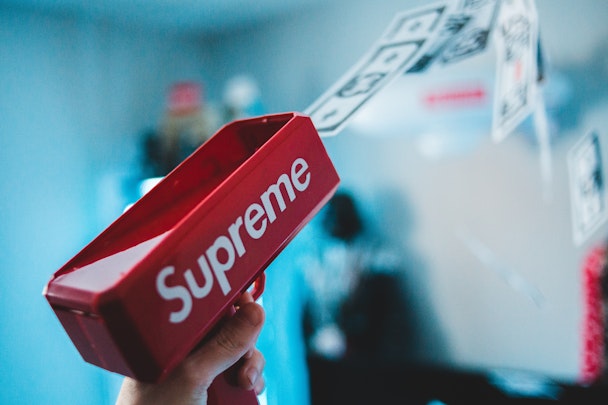Cultural communities will replace loyalty programs
Traditional loyalty programs are redundant, says Nerds’ Luke Hodson. It is cultural communities that drive advocacy. Hodson looks at how brands with devoted fanbases build long-lasting loyalty and demand through online spaces.

Supreme is a prime example of a cult brand / Erik Mclean via Unsplash
Brand loyalty programs are famously built around an outmoded transaction model, rather than actual brand loyalty and affinity. The current architecture rewards social interaction and financial transactions with rebate programs and cash-back points.
This creates a pyramid-like selling relationship, commodifying the brand. Bribe-based schemes can often isolate core customers and only attract price-sensitive consumers searching for a discount or looking to claim rewards.
Transactional relationships will not cultify a brand. Considering the first principles of a loyalty program, it’s about driving customer retention, attracting new customers and collecting valuable data. Consumers seek cultural commune, belonging, like minds, and shared cultural beliefs and interests. Culture-first communities speak to that need, and membership in these insider networks is what drives loyalty and helps drive perceived brand aspiration and cultural relevance.
Advertisement
Cult brand supremacy
Supreme is a cult brand icon that enjoys constant hype, resulting in sellout capsule drops, queues outside its stores and inflated product costs on the resale market. Its cult following, brand adoration and evangelization are unmatched. There are hundreds of unofficial groups, pages and profiles for Supreme insiders that congregate around their love for the brand, including supreme_leaks_news, suprememuseum, supremedropsGG, supreme-time and supremehustle +++.
Brands should forget kick-back mechanics and start cultifying themselves through culture-first communities. Starting micro, they should focus on the most culturally-engaged customers – those who patch their identity from the brand’s own cultural positioning.
The aim is to amplify cultural kudos through insider networks that offer exclusivity, prestige, perks, early access, unique content, custom or bespoke products and aspirational experiences. Brands need to provide their evangelists with a space to congregate both online – through channels such as Discord – as well as in person, facilitating meet-ups that foster peer unity and further strengthen connections around the brand.
Humans seek connection
Humans desperately seek and take pleasure from collectivism and cultural commonality that provide badges for identity projection. For the first time, technological shifts through web3 facilitate brand communities coming together in unprecedented ways. Brands can create gated communities with NFT access that help further perpetuate the myth of esteemed brand insider networks. Brands will have to stop thinking about extraction and start investing more than they get back. The benefit, however, is that once a loyal community is charged, it will pay off ten-fold.
Brands can onboard cult followers to blockchain, allowing for real-time feedback loops. Collaborations, product development and extension can be crowd-sourced through voting mechanics via DAOs, centering cult followers at the heart of the brand.
Brands can also tokenize these communities, turning cult customers into shareholders. It’s within these brand-loving micro-communities that credibility is incubated and spawned.
Community-driven collectives are a vital part of consumer psychology needs. Brands need to start looking at community-building as an opportunity for brand development and evolution, not another medium to push products and sales. New membership strategies should be always-on, with frequent value-adding moments, interactions and experiences.
Advertisement
Content by The Drum Network member:

NERDS Collective
NERDS Collective was founded by Luke Hodson In 2013 as a specialist agency that places brands at the frontline of street culture through hyper-nuanced consumer insights,...
Find out more
